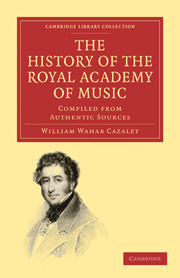Book contents
- Frontmatter
- Preface
- Biographical Sketch of the Right Hon. The Earl of Westmorland, G.C.B.
- Chapter I
- Chapter II
- Chapter III
- Chapter IV
- Chapter V
- Royal Academy of Music
- Chapter VI
- Chapter VII
- Chapter VIII
- Chapter IX
- Chapter X
- Chapter XI
- Chapter XII
- Chapter XIII
- Conclusion
- Biographical Sketches
- Appendix
Biographical Sketch of the Right Hon. The Earl of Westmorland, G.C.B.
Published online by Cambridge University Press: 29 August 2010
- Frontmatter
- Preface
- Biographical Sketch of the Right Hon. The Earl of Westmorland, G.C.B.
- Chapter I
- Chapter II
- Chapter III
- Chapter IV
- Chapter V
- Royal Academy of Music
- Chapter VI
- Chapter VII
- Chapter VIII
- Chapter IX
- Chapter X
- Chapter XI
- Chapter XII
- Chapter XIII
- Conclusion
- Biographical Sketches
- Appendix
Summary
The history of the Royal Academy of Music could not be considered complete unless intimately associated with the name of its noble founder, the Earl of Westmorland, Chairman of the Committee of Management.
John Fane, eleventh Earl of Westmorland, G.C.B., and G.C.H., a Privy Councillor, D.C.L., also a Lieutenant-General, and Colonel of the 56th Foot, son of the tenth Earl by his first wife, the only daughter and heiress of Robert Child, Esq., was born in 1784. At an early age he went into the army, and served with distinction in the various campaigns of the British army from 1805 to 1815. In 1811 his lordship married the third daughter of the third Earl of Mornington. As Envoy Extraordinary and Minister Plenipotentiary to the court of Tuscany, he served with the Austrian army in Naples, which ended in restoring the kingdom to its lawful sovereign. He was appointed Ambassador at Berlin in 1842; and in 1851 was removed to the higher distinction of Ambassador to the court of Vienna.
Such is a brief outline of the military and official services of Lord Westmorland. When quite a youth, and studying under a private tutor in Hertfordshire, the instinctive passion for music displayed itself; and he was even then distinguished as an amateur performer on the violin. On his removal to Trinity College, Cambridge, he still continued his studies, and placed himself under Dr. Hague, Professor of Music in the University.
- Type
- Chapter
- Information
- The History of the Royal Academy of MusicCompiled from Authentic Sources, pp. ix - xxivPublisher: Cambridge University PressPrint publication year: 2009First published in: 1854



